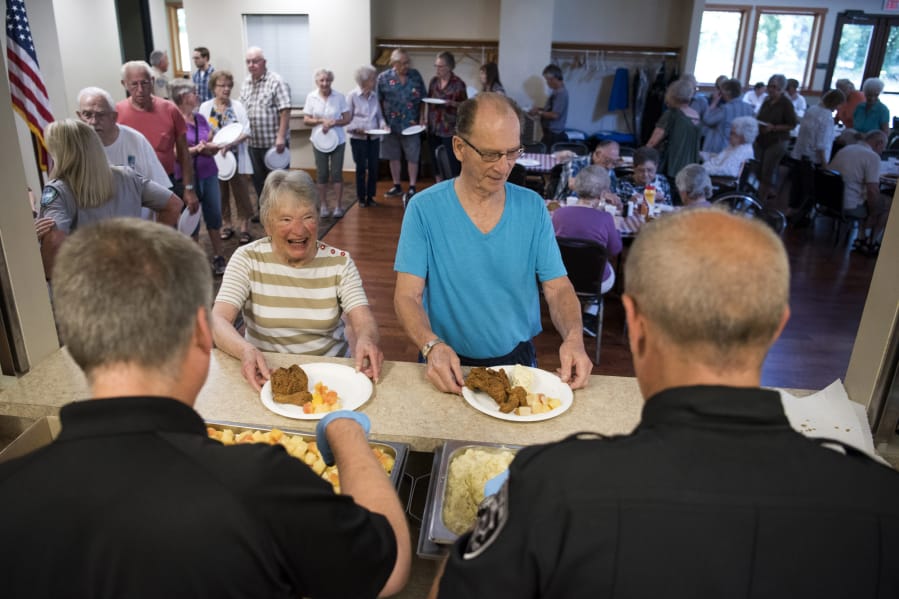Shortly after Laura Meyer and her husband, Donald Harvey Meyer, moved back to Vancouver in 2007, the couple went to a 50+ Connections expo at the Hilton.
“50+ Connections was a large kind of convention for older adults,” said Laura Meyer. “They had every group imaginable that’s important to seniors there, and one of them was SALT.”
That’s how Laura and Donald Meyer, ages 71 and 78, learned about Seniors and Law Enforcement Together — SALT for short — a joint program of the Clark County Sheriff’s Office, Camas Police Department and Vancouver Police Department. For more than two decades, the program has helped connect Clark County’s elderly population with police officers at city and county levels through a monthly series of informative meetings.
Kasey Frazier, outreach program assistant for the Clark County Sheriff’s Office, said that SALT’s “primary purpose is information on crime prevention and perception of crime.”
“Most of our seniors are pretty savvy to crime and scams, especially — we do a lot of emphasis on scams and phone scams, like the grandparent scam — most of them are pretty smart about that stuff,” she said.
Camas Code Enforcement Officer Tami Strunk has been a part of SALT since the program’s inception in 1995. She said that elder abuse was another perennial topic for SALT alongside scam awareness; elder abuse more often takes the form of financial exploitation than physical violence.
“We’ve had our fair share of cases of vulnerable adults, where somebody’s supposed to take care of them and starts spending all their money,” Strunk said.
In addition to meetings that discuss crime prevention, Strunk said that SALT tackles general health topics such as dementia and fall prevention.
“There’s so much that goes on in the community that the elder population is vulnerable to,” said Clark County Sheriff Chuck Atkins. “It started with us trying to make sure that they were taken care of in every way that we could, in partnership with a lot of other people.”
SALT, then and now
When SALT first came together, it was not just the brainchild of law enforcement groups. Joanne Bond, 87, had read about a similar program based out of Salem, Ore., in the newspaper and was active in starting such a program in Clark County. (Bond, a 25-year resident of Camas, recently moved to the Bedford, a retirement community in Vancouver.)
“They thought it would be a worthwhile cause to warn seniors about scams,” Bond said. “There were so many scams going around and so many seniors losing large amounts of money to these fast-talkers with big dreams.”
Since 1995, the groups within SALT’s sphere have undergone some changes. Washougal Police Department was one of the three founding groups, though they are no longer on SALT’s advisory board. (Washougal Police Chief Ron Mitchell didn’t know exactly when his department stepped down.) They have since been replaced by the Vancouver Police Department, which Strunk said joined within the last five years.
Strunk said that the Washougal, Battle Ground and Ridgefield police departments participate in some of SALT’s events, but that it was difficult for “small agencies” to be as involved.
“You can only get so many people in to plan these events,” Strunk said. “Probably since we’ve been doing it for this long, it’s kind of always just been Kasey and I.”
The topics of some of the meetings change as well. While SALT holds meetings about scam awareness and dementia every year, other issues are rotated in or out. For example, this year’s meeting schedule featured two new subjects: music therapy and emergency planning.
But the schedule of the meetings, and the engagement of the seniors who go to them, has remained consistent. SALT generally holds two meetings each month: a west side meeting in Hazel Dell on the third Monday of the month and an east side meeting in Camas on the fourth Monday of every month. (Occasionally, joint events will be held in Camas.) Frazier and Strunk estimated that about 20 seniors go to each meeting, depending on the topic, although the turnout at social events could be over 100.
Though many go to learn about the topics SALT discusses, there is also the draw of meeting new people. Carrie Glaser, 80, and Irene Cole, 80, both of Vancouver, have been going to SALT meetings for the better part of two decades. Cole found out about SALT through her church and got her friends involved.
“It’s a lot of fun to see all these people and mingle with them,” Glaser said.
And it seems that the officers involved get as much out of SALT as they put into it.
“As far as the senior citizens go, these folks have pretty much paid their dues, and it’s very nice for me personally to give back to them in this manner,” Mitchell said.
Atkins said that he often gets thanked by the people he serves, but that he’s just as grateful to be the one serving.
“The reality is, all of us get more out of it, I think, than they may, because this means a lot to us too,” he said. “It’s our way of saying thank you, being here.”




